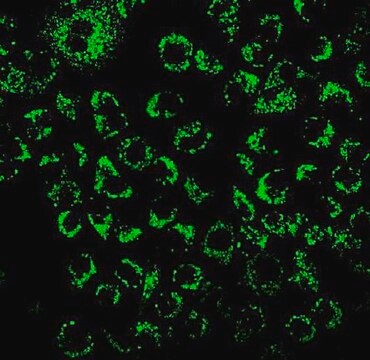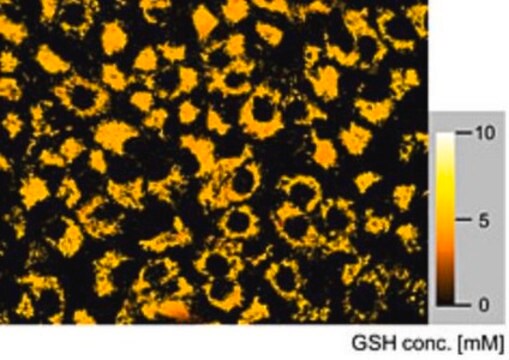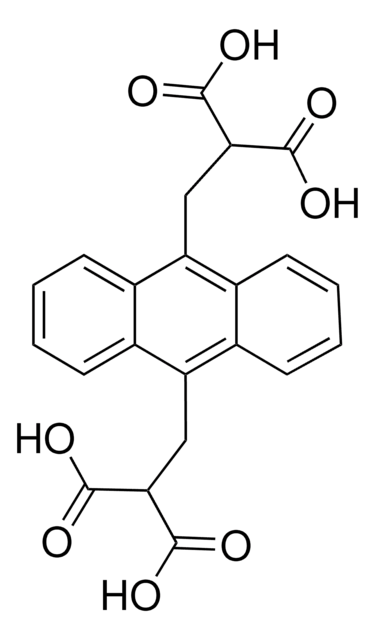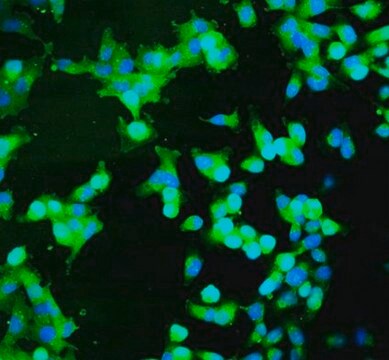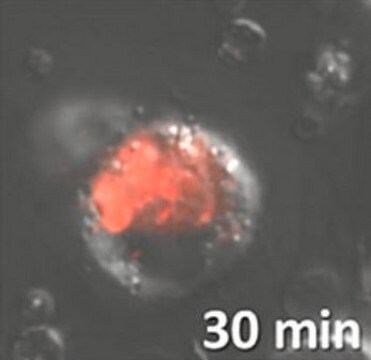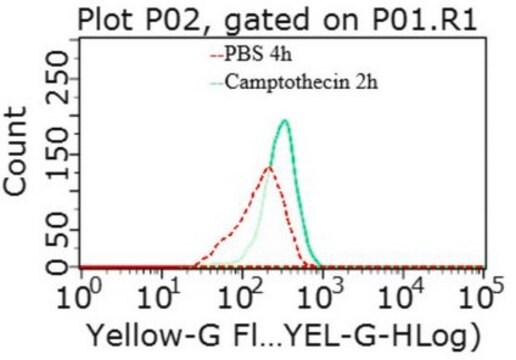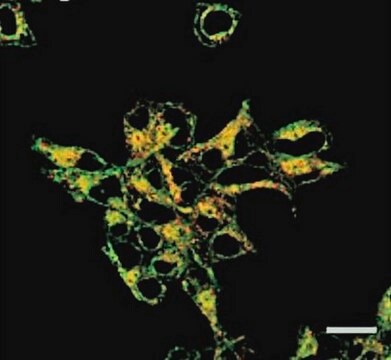SCT063
BioTracker Si-DMA Singlet Oxygen Live Cell Dye
Live cell imaging dye for singlet oxygen (1O2) localized to mitochondria. Singlet oxygen is important in the field of cancer therapy, photodynamic medicine and other skin treatments.
Sinônimo(s):
Live cell imaging probe
Faça loginpara ver os preços organizacionais e de contrato
About This Item
Código UNSPSC:
12352207
NACRES:
NA.47
Produtos recomendados
Ensaio
≥98% (H-NMR)
≥98% (HPLC)
≥98% (LC/MS)
≥98% (elemental analysis)
técnica(s)
cell based assay: suitable
método de detecção
fluorometric
Descrição geral
Singlet oxygen (1O2) is one of the reactive oxygen species (ROS). Singlet oxygen is known to be a cause of spots and wrinkles of the skin due to its very strong oxidizing potential. However, the reactivity of singlet oxygen, if controlled, can be used for therapy. In the field of cancer research and therapy, singlet oxygen is being used for photodynamic therapy (PDT), an emerging anticancer treatment using photoirradiation and photosensitizers.
BioTracker<TMSYMBOL></TMSYMBOL> Si-DMA Singlet Oxygen Live Cell Dye is a novel far-red fluorescence probe that is composed of silicon-containing rhodamine and anthracene moieties as a chromophore and a singlet oxygen reactive site, respectively. In the presence of singlet oxygen, fluorescence of BioTracker Si-DMA live cell dye increases 17 times due to endoperoxide formation at the anthracene moiety. The dye is highly selective to singlet oxygen, among seven different reactive oxygen species (1O2, O2-, H2O2, HOCL-, RCO-, OH-, NO). Among three different intracellular photosensitizers, BioTracker Si-DMA selectively detects the 1O2 that is generated by 5-aminolevulinic acid-derived protoporphyrin IX, localized in mitochondria. On the other hand, mitochondria-targeted KillerRed and lysosomal porphyrins could not induce fluorescence change in the dye.
Spectral Properties
Absorbance: 640 nm
Emission: 670 nm
BioTracker<TMSYMBOL></TMSYMBOL> Si-DMA Singlet Oxygen Live Cell Dye is a novel far-red fluorescence probe that is composed of silicon-containing rhodamine and anthracene moieties as a chromophore and a singlet oxygen reactive site, respectively. In the presence of singlet oxygen, fluorescence of BioTracker Si-DMA live cell dye increases 17 times due to endoperoxide formation at the anthracene moiety. The dye is highly selective to singlet oxygen, among seven different reactive oxygen species (1O2, O2-, H2O2, HOCL-, RCO-, OH-, NO). Among three different intracellular photosensitizers, BioTracker Si-DMA selectively detects the 1O2 that is generated by 5-aminolevulinic acid-derived protoporphyrin IX, localized in mitochondria. On the other hand, mitochondria-targeted KillerRed and lysosomal porphyrins could not induce fluorescence change in the dye.
Spectral Properties
Absorbance: 640 nm
Emission: 670 nm
Aplicação
Live cell fluorescent imaging
Live cell imaging dye for singlet oxygen (1O2) localized to mitochondria. Singlet oxygen is important in the field of cancer therapy, photodynamic medicine and other skin treatments.
Research Category
Cell Imaging
Cell Imaging
Research Sub Category
Live Cell Dye
Live Cell Dye
Qualidade
Purity: ≥ 98% confirmed by HNMR, LC-MS and HPLC and elemental analysis
Molar Mass: 513.77 g/mol
Molar Mass: 513.77 g/mol
forma física
Lyophilized
Armazenamento e estabilidade
Store BioTracker Si-DMA Singlet Oxygen Live Cell Dye at 0-5°C, desiccate and protect from light
Note: Centrifuge vial briefly to collect contents at bottom of vial before opening.
Note: Centrifuge vial briefly to collect contents at bottom of vial before opening.
Outras notas
Concentration: Please refer to lot specific datasheet.
Exoneração de responsabilidade
Unless otherwise stated in our catalog or other company documentation accompanying the product(s), our products are intended for research use only and are not to be used for any other purpose, which includes but is not limited to, unauthorized commercial uses, in vitro diagnostic uses, ex vivo or in vivo therapeutic uses or any type of consumption or application to humans or animals.
Código de classe de armazenamento
11 - Combustible Solids
Classe de risco de água (WGK)
WGK 3
Ponto de fulgor (°F)
Not applicable
Ponto de fulgor (°C)
Not applicable
Certificados de análise (COA)
Busque Certificados de análise (COA) digitando o Número do Lote do produto. Os números de lote e remessa podem ser encontrados no rótulo de um produto após a palavra “Lot” ou “Batch”.
Já possui este produto?
Encontre a documentação dos produtos que você adquiriu recentemente na biblioteca de documentos.
Sooyeon Kim et al.
Journal of the American Chemical Society, 136(33), 11707-11715 (2014-07-31)
Singlet oxygen ((1)O2), molecular oxygen in the lowest excited state, has a critical role in the cell-killing mechanism of photodynamic therapy (PDT). Although (1)O2 phosphorescence measurement has been mainly used to monitor (1)O2 formation during PDT, its intensity is far
Nossa equipe de cientistas tem experiência em todas as áreas de pesquisa, incluindo Life Sciences, ciência de materiais, síntese química, cromatografia, química analítica e muitas outras.
Entre em contato com a assistência técnica